 I want to live a contemplative life and, as an extension of that, to be a contemplative writer. I already tend toward that kind of life. I love thinking and getting into the deep space in my mind to explore and make connections. But getting into that space in a meaningful way can be difficult because it requires time and space. If there are no empty spaces for contemplation, there is no contemplation.
I want to live a contemplative life and, as an extension of that, to be a contemplative writer. I already tend toward that kind of life. I love thinking and getting into the deep space in my mind to explore and make connections. But getting into that space in a meaningful way can be difficult because it requires time and space. If there are no empty spaces for contemplation, there is no contemplation.
 I find it heartening that in the face of incomprehensible loss, when life was stripped down to its most meager essentials, many entrusted their painful sojourn to an aesthetic creation. I can’t help but think that something within them believed that shaping their sorrow into art was indispensable, that it was precisely what their broken and wounded selves needed to find some semblance of home again.
I find it heartening that in the face of incomprehensible loss, when life was stripped down to its most meager essentials, many entrusted their painful sojourn to an aesthetic creation. I can’t help but think that something within them believed that shaping their sorrow into art was indispensable, that it was precisely what their broken and wounded selves needed to find some semblance of home again.
 The church was a place of incredible, deliberate, beauty. It had been some time since I’d been in a place of worship so utterly beautiful. As I walked down the main aisle and then the smaller aisles at the south and north portals, my son walked beside me. He’d never been in a church like this. It was his first time to behold, and in his little mind configure, how a church can look like this. Here is a human-made artifact of craftsmanship that, somehow, actually embodies the joy—the nearly incomprehensible reality—of Emmanuel, God with us.
The church was a place of incredible, deliberate, beauty. It had been some time since I’d been in a place of worship so utterly beautiful. As I walked down the main aisle and then the smaller aisles at the south and north portals, my son walked beside me. He’d never been in a church like this. It was his first time to behold, and in his little mind configure, how a church can look like this. Here is a human-made artifact of craftsmanship that, somehow, actually embodies the joy—the nearly incomprehensible reality—of Emmanuel, God with us.
 As spring approaches in Cambridge, I’m switching over to (another) new workplace. My daily routine is shifting again, as the afternoon light grows stronger and the tulips poke up through the ground. But as I adjust to my new rhythm, I know I’ll be continuing my daily trips to Darwin’s. Because it’s delicious and homey and comforting. Because my blood, on some days, is about 20 percent spicy chai. Because I’m a regular. Recognized, welcomed, known. And it feels good.
As spring approaches in Cambridge, I’m switching over to (another) new workplace. My daily routine is shifting again, as the afternoon light grows stronger and the tulips poke up through the ground. But as I adjust to my new rhythm, I know I’ll be continuing my daily trips to Darwin’s. Because it’s delicious and homey and comforting. Because my blood, on some days, is about 20 percent spicy chai. Because I’m a regular. Recognized, welcomed, known. And it feels good.
 To assess the secrets we now possessed, my sister and I dismantled every carefully hoarded collection of Cool Whip containers, Styrofoam meat dishes, “brand new” household appliances, and unworn lace. The things no one could use alongside the things someone might want to use. And then there were the things only she loved, the things that told her who she was and what kind of life she had cherished. Things that tell the story of who she thought she was.
To assess the secrets we now possessed, my sister and I dismantled every carefully hoarded collection of Cool Whip containers, Styrofoam meat dishes, “brand new” household appliances, and unworn lace. The things no one could use alongside the things someone might want to use. And then there were the things only she loved, the things that told her who she was and what kind of life she had cherished. Things that tell the story of who she thought she was.
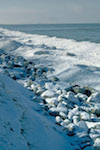 Twenty years ago, I sat on a frozen wave knowing that at any moment it could break and I would drown. Nothing I could do would save me. Today, I am doing all the right things, and still the water could take over and change my life.
Twenty years ago, I sat on a frozen wave knowing that at any moment it could break and I would drown. Nothing I could do would save me. Today, I am doing all the right things, and still the water could take over and change my life.
I am reading God for Us during Lent, and in today’s reading, Lauren Winner suggests that God is both a refuge from a storm and the storm itself. I wonder what Jesse would think of this metaphor if I were to ask him about it. I wonder what he thinks about my creating a story from the work he does. When he comes home, I hope to ask him.
 Though it shook her, Una loved the book. In fact she turned around and read it again straight through. I wanted to ask about it, but tried to give her space. I wondered how she experienced the story; I wondered at the contours of her approach toward, and immersion in, this particular encounter—with the characters, the tragedy, and ultimately with her own mortality.
Though it shook her, Una loved the book. In fact she turned around and read it again straight through. I wanted to ask about it, but tried to give her space. I wondered how she experienced the story; I wondered at the contours of her approach toward, and immersion in, this particular encounter—with the characters, the tragedy, and ultimately with her own mortality.
 To take tea is to receive something; it is a gift of mindfulness, gentleness and grace. To partake in company is to merge with a great tradition of civilized communion, which has its version in nearly every culture on earth. Whether it’s matcha sipped reverently in a Japanese teahouse, smoky “Russian Caravan” steeped in a Moscow samovar, or mint tea poured from a standing position with a distinctly Moroccan flair, the allure of ritual remains. There’s something so affirming about connecting with the way things have always been done—or, at least the way they’ve been done for a long, long time.
To take tea is to receive something; it is a gift of mindfulness, gentleness and grace. To partake in company is to merge with a great tradition of civilized communion, which has its version in nearly every culture on earth. Whether it’s matcha sipped reverently in a Japanese teahouse, smoky “Russian Caravan” steeped in a Moscow samovar, or mint tea poured from a standing position with a distinctly Moroccan flair, the allure of ritual remains. There’s something so affirming about connecting with the way things have always been done—or, at least the way they’ve been done for a long, long time.
When a Dream Becomes a Life
Vocations are not occupations, though they are integrally woven together. To know the difference and the difference it makes is critical, and much of the grief we experience is borne of missing one for the other. Vocation is always the longer, deeper story of someone’s life; for Joy, she was always the creative creator of things she would make that the whole world would someday enjoy. Occupation is not that, but is more the way we describe the things we do along the way of life, entering into particular responsibilities and relationships that are ours, and while shaping and forming us, are more often than not signposts of the deeper vocation. They are not the point; they point to the point.
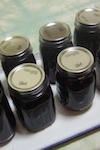 I’m told I’m a good hostess. Plenty of interesting food—down-home victuals perked up by saucy suggestions found in vintage recipe books. I get people talking. I listen for laughter and bring out more food, and by the time the last mug is laid to rest on the coffee table, I’m exhausted. I go to bed saying it was so much work I’m never going to host another dinner. But in the morning I awake smiling, knowing a good time was had by all who came expecting one. Like my mother, I enjoy having entertained, enjoy having offered my home-cooked sustenance.
I’m told I’m a good hostess. Plenty of interesting food—down-home victuals perked up by saucy suggestions found in vintage recipe books. I get people talking. I listen for laughter and bring out more food, and by the time the last mug is laid to rest on the coffee table, I’m exhausted. I go to bed saying it was so much work I’m never going to host another dinner. But in the morning I awake smiling, knowing a good time was had by all who came expecting one. Like my mother, I enjoy having entertained, enjoy having offered my home-cooked sustenance.
Maybe I’m like my mom in yet another way. Mom’s mind-set in me may explain why I continue to pursue creative writing when it’s one of the most strenuous mental workouts I can imagine.
 It isn’t normal for a drummer to call an artist and say, “I’m going to play on your next album, and we are going to do it like this.” He and Matt Pierson (the gift of studio time was for the two of them) were very gentle and careful the way they went about it, and so I was able to get into a different place. What would I write if I wasn’t thinking about audience and due dates? I really wanted to lean into being a songwriter, taking the craft seriously. I wanted to write from a more intuitive place. Writing is never easy for me, but it did help to have this wide-open invitation to write whatever I wanted.
It isn’t normal for a drummer to call an artist and say, “I’m going to play on your next album, and we are going to do it like this.” He and Matt Pierson (the gift of studio time was for the two of them) were very gentle and careful the way they went about it, and so I was able to get into a different place. What would I write if I wasn’t thinking about audience and due dates? I really wanted to lean into being a songwriter, taking the craft seriously. I wanted to write from a more intuitive place. Writing is never easy for me, but it did help to have this wide-open invitation to write whatever I wanted.
 My first baby was an Advent baby. Born just a few days after the Church calendar turned over in late November, she arrived in the thick of Christ’s own birth season. As such, her birthday (and mine too, in a sense) now serves as a preface to all of my Advent meditations, forever changing the way I come into Christmas each year. It invites me to remember the vivid physicality of her birth — its pure wonder and raw intensity — and to ponder the Christmas story in light of it. Particularly the role of Mary, who was singly invited and appointed to aid in bringing deliverance to mankind through her own very natural delivery.
My first baby was an Advent baby. Born just a few days after the Church calendar turned over in late November, she arrived in the thick of Christ’s own birth season. As such, her birthday (and mine too, in a sense) now serves as a preface to all of my Advent meditations, forever changing the way I come into Christmas each year. It invites me to remember the vivid physicality of her birth — its pure wonder and raw intensity — and to ponder the Christmas story in light of it. Particularly the role of Mary, who was singly invited and appointed to aid in bringing deliverance to mankind through her own very natural delivery.
Advent: Calling the Dreamers and Realists, Prophets and Pragmatists
Advent is the time when longing and unmet desires meet celebration and fulfillment, holding the two ends of the spectrum of our human experience in tension without denying either of them. Grief and hope, pain and joy together. Because honestly, how often are we not feeling both simultaneously in some way?
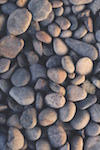 Where was the mystery I’d felt as a child, the anticipation and excitement? The flicker of hope in the candlelight of our Christmas Eve vigil? In the midst of stockpiling my childhood traditions of Christmas joy and imposing them on the life of my new immediate family, I seemed to have signed up for more than my spirit could handle.
Where was the mystery I’d felt as a child, the anticipation and excitement? The flicker of hope in the candlelight of our Christmas Eve vigil? In the midst of stockpiling my childhood traditions of Christmas joy and imposing them on the life of my new immediate family, I seemed to have signed up for more than my spirit could handle.
And then Peter began collecting little things.
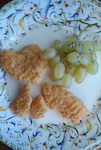 It’s not only that God shines out from orange slices and bookshelves. It’s that with grace, these things make love and goodness. These things—caring for these things, building and cleaning and keeping these things—make a place for the heart to rest and be cared for.
It’s not only that God shines out from orange slices and bookshelves. It’s that with grace, these things make love and goodness. These things—caring for these things, building and cleaning and keeping these things—make a place for the heart to rest and be cared for.
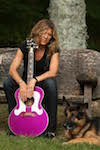 I am contemplative and introverted. I am tactile and love to make things. These are all catalysts for articulating my individuality. I am also an alcoholic, a drug addict, an egomaniac with an inferiority complex and an emotional lightning rod. These things do not supply my identity either, though they are as much a part of me as the traits I cherish. And I am equally grateful for them because the helplessness they triggered ushered me further into dependence on God and finding my place on the path, one step at a time.
I am contemplative and introverted. I am tactile and love to make things. These are all catalysts for articulating my individuality. I am also an alcoholic, a drug addict, an egomaniac with an inferiority complex and an emotional lightning rod. These things do not supply my identity either, though they are as much a part of me as the traits I cherish. And I am equally grateful for them because the helplessness they triggered ushered me further into dependence on God and finding my place on the path, one step at a time.
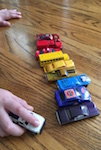 Young children naturally explore who they are and what their world is by spending their time wondering and discovering the world through the joy of play. I learned about friendship, nature, and my small town Ohio world in my hours of play with my friend Kim, and those memories have inspired me to give my own children time and opportunity to imagine and wonder without my interference. The mystery and magic of the benefits of play must be experienced as a child, and if a little water and mud are mixed into the process, then it’s even better.
Young children naturally explore who they are and what their world is by spending their time wondering and discovering the world through the joy of play. I learned about friendship, nature, and my small town Ohio world in my hours of play with my friend Kim, and those memories have inspired me to give my own children time and opportunity to imagine and wonder without my interference. The mystery and magic of the benefits of play must be experienced as a child, and if a little water and mud are mixed into the process, then it’s even better.
 Language distinguishes us, but it’s still just empty space. Space I can see but not touch, and that’s not enough. I need to hold onto a meaning with texture, with a sharpness that cuts into my hands, gets in my blood.
Language distinguishes us, but it’s still just empty space. Space I can see but not touch, and that’s not enough. I need to hold onto a meaning with texture, with a sharpness that cuts into my hands, gets in my blood.
If this is so important, why don’t I understand it, why isn’t it obvious?
 Like committing crummy jokes to memory, remembering is intentional, the discovery of great gain in contentment. Where the debris of spilled baggage reaches its angle of repose, the place where physical objects come to rest along an incline (to borrow from Wallace Stegner), there is rest from the near-constant onslaught of shame, of striving to be enough, to make ourselves worthy, to, in effect, make gods of ourselves. And maybe not being enough is a healthy place to be, a place where God is good and is enough, all the time.
Like committing crummy jokes to memory, remembering is intentional, the discovery of great gain in contentment. Where the debris of spilled baggage reaches its angle of repose, the place where physical objects come to rest along an incline (to borrow from Wallace Stegner), there is rest from the near-constant onslaught of shame, of striving to be enough, to make ourselves worthy, to, in effect, make gods of ourselves. And maybe not being enough is a healthy place to be, a place where God is good and is enough, all the time.
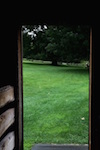 I think fiction writers do have something I lack. They must have the capacity to close their eyes, at least a little bit, to the world outside their window. With eyes half open they are free to imagine. Free to conjure whole worlds and lives. They are magicians as much as artists, and I am the grateful recipient of their magic.
I think fiction writers do have something I lack. They must have the capacity to close their eyes, at least a little bit, to the world outside their window. With eyes half open they are free to imagine. Free to conjure whole worlds and lives. They are magicians as much as artists, and I am the grateful recipient of their magic.
But I cannot close my eyes. Not even a little bit. I write nonfiction because so many memories are tapping at my window, there is no room left in my mind for any invention. I am wholly preoccupied observing and studying that which is already there.
















